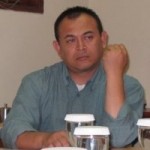Background
A common notion among Indonesians is that living in the main cities within Java can provide the luxury of comfortable and peaceful leaving, which can hardly be attained outside of Java. This notion is grounded on the reality that even after 69 years of independence, the development outside Java has been very slow. Such problem is more severe in the eastern parts of Indonesia, such as Papua, where development is almost non-existent off of the coastal lines. For this very reason, the past three Overseas Ministry Conferences (OMC) have been focused on the rural development of Indonesia. The past three OMCs revealed three main reasons why rural development in Indonesia has not been successful: the broken culture, government dysfunction, and leadership deficiency.
Speakers
Bob Osburn
Bob Osburn ha a PhD in international education (University of Minnesota, 2005) where he also is a lecturer in the Department of Organizational Leadership, Policy, and Development. In 1978 he earned his ThM in Christian education at Dallas Theological Seminary. He has spent 29 years working in international student and academic ministry at the University of Minnesota, and successfully launched the 1998 World View for World Healing Conference that promoted the vision for international students engaging the deepest needs of their societies on the basis of a Christian worldview. He has been married to Susan for over 38 years, and is the father of four sons.
Nickholas T. Wiratmoko
He is working at PT. SURE Indonesia. Currently, he is working on SURE’s Smart Village project in Sopeng in South Sulawesi. He used to be a researcher at the Percik Institute (Institute for Social Research, Democracy, and Social Justice) in Salatiga Indonesia. He obtained his first degree in agronomy and his Master in development studies both from Satya Wacana Christian University. His research activities are centered on advocacy of good governance, teritorial reforms, and local politics. He has been an active member of the Salatiga Circle for In-Depth Study of Science and Religion Relation (SCISORARR) and he has also been working with several NGO’s mostly in the area of environment, water advocacy, energy policy advocacy. He has published several papers in Indonesian journals, conference proceedings, and written a book titled: “Yang Pusat dan Yang Lokal” published in 2004.
Ferini Handayaningsih
Mrs. Handayaningsih is full-time employee of Beads of Java, whose aim is to reach village women near Salatiga, Indonesia area in a community where women have difficulty meeting the daily needs of their families. The goal of Beads of Java is to prevent village women from becoming victims of human trafficking. http://www.beadsofjava.org/
Background
A common notion among Indonesians is that living in the main cities within Java can provide the luxury of comfortable and peaceful leaving, which can hardly be attained outside of Java. This notion is grounded on the reality that even after 69 years of independence, the development outside Java has been very slow. Such problem is more severe in the eastern parts of Indonesia, such as Papua, where development is almost non-existent off of the coastal lines. For this very reason, the past three Overseas Ministry Conferences (OMC) have been focused on the rural development of Indonesia. The past three OMCs revealed three main reasons why rural development in Indonesia has not been successful: the broken culture, government dysfunction, and leadership deficiency.
The consequences of a broken culture are displayed in the paradoxical conditions of rural Indonesia. Despite the abundance natural resources and fertile soil, the communities are still lacking food, clean water, shelter and other fundamental needs. We believe that a transformation of a people can only start when the truth of the Gospel is manifested in the culture. As truth penetrates and begins transforming the culture, old values that are detrimental to progress will be replaced. People will become more trustworthy, hardworking, and more innovative. People can be given better tools, methods, and capital which will result in a prosperous and independent community.
The second reason for underdeveloped rural areas is the government development model that is not working. There are many programs, funded by international or national governments, to aid rural area development. These aids are usually intended to build infrastructure and develop the people. However many governmental bodies, especially the corrupt ones, choose to build only infrastructure, while neglecting human development, for the pursuit of immediate fund utilization. Short-term infrastructure projects are often preferred because they promise immediate monetary benefits (including corruption opportunities), involve a lot of capital, make headline news, and are popular among the residents who often make uneducated short-termed judgment. The newly built infrastructure sometimes does not address the need of the local community. For instance, a newly built power plant and roads are made to serve an outside large industry to showcase economic growth. Local governments favor large outside companies rather than the small local ones because they local ones promise too slow of a return and require more difficult long-term planning. Outside industry sometimes comes with a cost that is unbearable to the life quality and the environment. When this occurs, the local human resource continues to be under developed even after massive government aid.
The third main reason is the missing leadership by the local community. As an insider, a local leader understands the main needs of his/her community therefore investments in infrastructure and people are better directed and sustainable. Unfortunately, most rural areas do not have capable people let alone visionary leaders. It takes time to develop the people. Outside aid institutions and government, seeking quick wins, do not have the patience to wait for the capable people to be developed. Furthermore, the types of project that improve daily life quality such as clean water and sanitation do not necessarily spur rapid economic growth.
In addressing the three issues above, FICA engages in partnership with three institutions (2 non-profit and 1 for profit) that focus in training local leaders. From our discovery trip in October 2013, we found that local leaders that were trained in Jakarta and sent back to rural areas cannot sustain themselves indefinitely without the help of outside financial support. Financial support is needed because the local resources are still raw and/or difficult to be sold in the market. The lack of infrastructure, product quality and appeal, and high prices were found to be the main factors hindering sales and thus resulting in lack of income.
Objective of 21st OMC
In response to the discovery trip findings, we are proposing to study a plan to set up low-tech and low-cost manufacturing sites in rural area during the conference. Rural Area Manufacturing is defined as an activity to increase the income of an enterprise by adding value to local raw natural resources. The selection of this theme is based on the benefits of obtaining manufacturing capability. Historically, manufacturing is the most proven way to drive economy, is adaptable to local resources, and it provides an avenue for people to be trained. A United Nations study in 2009[i] concluded that manufacturing is one of the main engines for growth for developing countries to catch up. Studies by prominent economists Sachs[ii] and Asmus[iii] suggested that poverty in developing countries can be reduced significantly within one generation. China is the prime example of such phenomenon. The engine that drives China’s phenomenal growth has been manufacturing. Manufacturing has been shown to not only have the highest productivity gain (which results in higher profit margin), but also the highest spillover effects which create other jobs and technologies to be used in other sectors.
In the early days (1958 to 1985), China set up enterprises in rural areas to absorb labor and spur growth throughout the country. Many of these enterprises were small scale manufacturing that gave added value to the local natural resources. This is one of the advantages of manufacturing, adaptability. A key competitive edge of smaller manufacturers when competing with their larger counterparts is obtaining raw materials with a lower cost. In typical manufacturing, the cost of raw material is approximately half of the price of the product. Ensuring supply of cheaper and better quality raw material is a must for any manufacturer to survive. Small manufacturers that are located close to the source has secured a sizable advantage over its competitor.
Manufacturing provides a perfect environment for people to be trained in their characters, leaderships, and servanthood. To produce a single product, a manufacturer needs collaboration from a lot of people. It takes a right system and culture for manufacturer to survive. It requires discipline to manage the allocated resources to produce the products, to accumulate capital, to balance plant capacity to market demand, to minimize inventory, etc. It takes a humble but capable servant leader in every facet of the manufacturing to make all these intricacies working in sync. It also requires one to continually develop the next generation leader to fill the vacant spot as business expands.
The positive effects of enabling manufacturing in rural areas promote the fulfillment of our calling as the image bearer of God. When God said in Genesis 1:26, “Let us make man in our image, after our likeness”, He intends for us to subdue the earth so that we can sustain our livelihood. Now as the whole earth has fallen into sin, the work to sustain our livelihood became harder. Sometime, we need to process food to ensure safety, freshness, and to extract. We need to develop machinery to produce enough for the consumption of the population. All these challenges require us to respond to our calling as engineers, scientists, businessmen, clergy, etc. The presence of manufacturing will create jobs for the community. The employees need doctor, cooks, and clergy to ensure both physical and spiritual health. A functioning community can then be developed because manufacturing can sustain itself economically and introduce enabling technologies for other sectors.
There are a variety of ways in fulfilling our Christian calling to worship God, but considering the circumstances, we believe that local manufacturing is the effective method to transform people in rural Indonesia. The Bible tells us that we are worshipping God by responding to our calling (Ephesians 2:10) and by extending His love to others (Matthew 22:37-39). We can accomplish this through building manufacturing as long as we heed to God’s principals. We should never give up as it is said in Micah 7:8. We should never be greedy (Proverbs 30: 8) and exploit the workers (Colossians 4:1). Most importantly we should remember that in all we do, we do it with sincere heart and unto the Lord (Ephesians 6:7). No matter who we are, whether as a slave or master (Ephesians 6).
Conclusion
Improving the livelihood of people in rural areas of Indonesia aligns with God’s intention for us to be His image bearer. Manufacturing provides an avenue for workers to be developed intellectually, economically, and certainly spiritually when God’s principals are applied. The main elements of discussion during OMC 21 will be the people’s mindset, government policies, and leadership traits. At the end of the OMC we expect the participants to be able to 1) understand the impact of current government policies toward rural development, 2) identify access points to develop small manufacturing, and 3) to develop an entry strategy for a sustainable and profitable small manufacturing.
[i] A. Szirmai. Is Manufacturing Still the Main Engine of Growth in Developing Countries?. United Nations University, World Institute for Development Economics Research (WIDER), Angle newsletter. May 2009.
[ii] J. Sachs. The End of Poverty: How We Can Make it Happen in Our Lifetime. Penguin Books. February 2006.
[iii] W. Grudem and B. Asmus. The Poverty of Nations: A Sustainable Solution. Crossway. August 2013.



